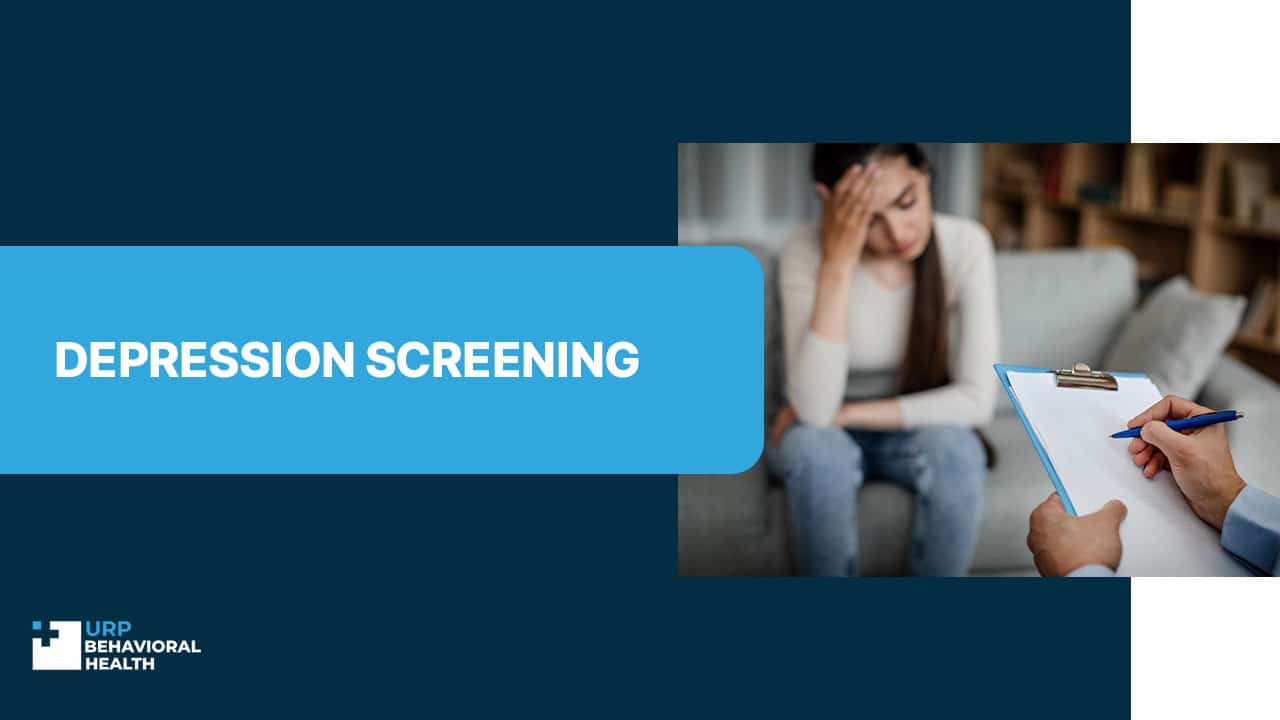
Depression Screening
Around 8% of adult Americans suffer from depressive disorder, as stated by the American Academy of Family Physicians [1]. People suspecting they might have this mental health condition are getting tested for depression prior to receiving a diagnosis. You may encounter various types of screening for depression around the Web, but tests to diagnose depression are not to be trifled with.
How to get checked for depression, and can you get tested for depression at home? If you wonder, “Where do I go to get tested for depression?”, let’s dive into the topic for the answers.
What Is Depression Screening?
The screening procedure involves taking specialized diagnostic tests for depression, which comprise a set of questions aimed at identifying major depressive symptoms [2]:
- Lasting sorrowful, anxious, or “numb” emotional state;
- Gloom or melancholy;
- Testiness, despair, or uneasiness;
- Guilt, low self-worth, or feebleness;
- No interest in normal hobbies and activities;
- Deficit of energy;
- Troubles with concentrating, reminiscence, or decision-making;
- Problems with sleep (waking too early or oversleeping);
- Shifts in appetite;
- Considerable weight changes;
- Unreasonable headaches or digestive issues that do not pass with treatment;
- Suicidal thoughts or attempts.
Our team will verify your insurance and design a plan tailored to your needs.
Mental health tests for depression can be a helpful additional means to make a symptom diagnosis, but it’s not a decisive factor. Psychiatrists rather rely on their professional expertise and clinical impressions of a patient’s psychological assessment than on tests to determine depression [3]. Therefore, if you are looking for an accurate test to know if you are depressed, you should change your tactics. Opting for professional assistance will help you better distinguish whether you fit into the depressive category and understand the condition’s severity rather than pondering “How do I get checked for depression with a web-based test?”.
What Is a Depression Test Used For?
A medical test for depression serves various purposes:
- As a supplementary method of diagnosis;
- To check on the condition’s severity;
- To specify the type of depression (major depressive disorder, dysthymia, seasonal affective disorder, and postpartum depression [4]).
Can you be tested for depression online? To pick the right depression diagnostic test, healthcare experts consider the patient’s age and cultural and linguistic aspects. Except for a test for signs of depression, psychiatrists also take into account patients’ life circumstances and problems and may add them as a secondary diagnosis [3].
Key Types of Depression Screening Tools
You may better understand what is a depression screening test by examining their main types:
- Self-report questionnaires. Used for comprehensive assessment of the frequency, intensity, and severity of depressive symptoms according to the criteria in DSM-5 [5]. They include various multiple-choice questions covering emotional and physical aspects of the disorder and are usually done as part of a regular health checkup or holistic treatment.
- Clinically administered rating scales. Highly valued for diagnostic precision, they provide a well-structured framework to assess symptoms of depression. These tools help mental health professionals make sufficiently informed decisions for efficient intervention and treatment.
Can you test for depression by sending your body samples to a laboratory? Currently, there is no lab testing for depression [6], but laboratory studies can be applicable to eliminate the likelihood of medical diseases that may manifest as major depressive disorder.
How to Get Screened for Depression: Process in a Nutshell
How does a doctor test for depression? Professional screening may involve undergoing a diagnostic test of depression and a physical exam in case a mental health expert suspects other diseases with similar symptoms. Both procedures do not require any preparation and are ultimately risk-free.
A diagnostic test for depression commonly comprises a standard set of questions. Your answers provide a doctor with data about:
- Family history of mental health conditions;
- Your individual medical history;
- Mood swings;
- Changes in your regular sleep pattern;
- Appetite or weight fluctuations;
- Shifts in energy levels;
- Capacity to concentrate;
- Stress intensity;
- Adherence to medicines routine;
- Substance use.
We’ll help you understand your options and guide you toward care.
Your mental health provider may also ask you about your feelings and demeanors in more detail. Such screening tools are indispensable for early symptom detection and evaluation and further treatment plan development.
When to See a Doctor
Given a multitude of options popping up when you google “Is there a test for depression?” you might be tempted to play a mental health professional and check out how do you screen for depression by yourself. The fidelity of such screening is dubious: even though the results might be precise, it’s vital to decipher them properly, which only an expert can do. Besides, a doctor takes into account a holistic picture of your cognitive, physical, and emotional state, as well as your personal and family history of psychiatric disorders.
Thus if you notice symptoms or are at risk of depression, don’t engage in self-diagnosis and contact a healthcare professional to receive the fitting treatment. We’ll give you a prompt on where to get tested for depression a bit later.
Explore whether you fall into the category of people susceptible to risk factors of depression [7]:
- family background of mental health conditions;
- personal history of depressive disorder;
- conduct disorder;
- substance use;
- complex grief;
- chronic medical conditions;
- lasting sleep disruption;
- unemployment;
- disability;
- loneliness;
- lack of social support;
- single relationship status;
- divorce.
Doctors may use screening tools for a preliminary assessment, but they don’t prioritize them above years of professional expertise and practice. The only right answer to “How to know whether I have depression?” is to reach a healthcare expert and no other way.
Where Can I Get Tested for Depression?
If at this point you are ready to make a move toward your mental health, well-versed medical professionals at URP Behavioral Health, Florida, are ready to support you. Our licensed therapists work with a number of mental health conditions and offer a wide scope of therapeutic approaches to address your specific challenges and help you recover.
Contact our admissions team now to begin your path toward a brighter future.
References:
- Douglas M. Maurer et al. Depression: Screening and Diagnosis. Am Fam Physician. 2018; 98(8): 508-515. Link: https://www.aafp.org/pubs/afp/issues/2018/1015/p508.html. Access date: July 13, 2025.
- Marcus et al. Depression: A global public health concern. January 2012. Link: https://www.researchgate.net/publication/285075782_Depression_A_global_public_health_concern. Access date: July 13, 2025.
- Annette S. Davidsen, Christina F. Fosgerau. What is depression? Psychiatrists’ and GPs’ experiences of diagnosis and the diagnostic process. 2014 Nov 6. Link: https://pmc.ncbi.nlm.nih.gov/articles/PMC4224702/. Access date: July 13, 2025.
- S. Department of Health and Human Services. National Institutes of Mental Health. NIH Publication No. 24-MH-8079. Depression. 2024. Link: https://www.nimh.nih.gov/sites/default/files/health/publications/depression/depression.pdf. Access date: July 13, 2025.
- Substance Abuse and Mental Health Services Administration. Rockville (MD): Substance Abuse and Mental Health Services Administration (US); 2016 Jun. DSM-5 Changes: Implications for Child Serious Emotional Disturbance. Link: https://www.ncbi.nlm.nih.gov/books/NBK519712/table/ch3.t5/. Access date: July 13, 2025.
- Suma P. Chand, Hasan Arif. Depression. Link: https://www.ncbi.nlm.nih.gov/books/NBK430847/. Access date: July 13, 2025.
- Tianna Hicklin. Factors that affect depression risk. NIH Research Matters. September 1, 2020. Link: https://www.nih.gov/news-events/nih-research-matters/factors-affect-depression-risk. Access date: July 14, 2025.
















